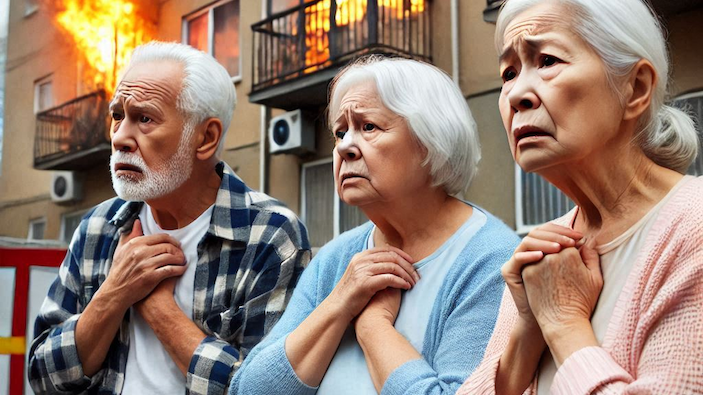 Fire safety is especially crucial for seniors due to their increased vulnerability to fire-related injuries and fatalities. Here are key fire safety tips and steps seniors and caregivers can take to minimize risks and ensure preparedness:
Fire safety is especially crucial for seniors due to their increased vulnerability to fire-related injuries and fatalities. Here are key fire safety tips and steps seniors and caregivers can take to minimize risks and ensure preparedness:
Preparation Tips for Fire Safety
- Install Smoke Alarms:
- Ensure smoke alarms are installed on every level of the home, in bedrooms, and outside sleeping areas.
- Use interconnected smoke alarms so when one sounds, they all sound.
- Test alarms monthly and replace batteries at least once a year.
- Create and Practice an Escape Plan:
- Develop a fire escape plan tailored to the senior’s mobility and health needs.
- Practice the plan regularly, identifying at least two ways to exit each room.
- Include clear communication with caregivers or neighbors about the escape plan.
- Fire Extinguishers:
- Keep fire extinguishers in accessible areas, such as the kitchen or near fireplaces.
- Teach seniors and caregivers how to use them (PASS method: Pull, Aim, Squeeze, Sweep).
- Reduce Fire Hazards:
- Avoid overloading electrical outlets and replace damaged cords.
- Keep space heaters at least three feet away from flammable materials.
- Never leave cooking unattended and clean grease buildup in the kitchen.
- Consider Assistive Technologies:
- Use strobe light smoke alarms or bed shakers for individuals with hearing impairments.
- Install automatic shut-off devices for stoves and other appliances.
- Encourage a No-Smoking Rule Indoors:
- Prohibit smoking inside the home or around flammable materials.
- Provide a designated outdoor area with safe disposal methods for cigarettes.
- Maintain Accessibility:
- Ensure doorways, hallways, and windows are clear and easy to navigate.
- Keep mobility aids (wheelchairs, walkers) near the senior at all times.
Actions to Take if a Fire Breaks Out
- Stay Low and Exit Safely:
- Crawl under smoke to avoid inhaling toxic fumes.
- Use a damp cloth over the mouth and nose if smoke is thick.
- Do Not Use Elevators:
- Always use stairs if possible, as elevators may fail during a fire.
- Follow the Escape Plan:
- Head immediately to the designated exit or safe meeting area.
- Do not re-enter the home for personal belongings.
- Call for Help:
- Dial 911 after safely exiting the building.
- Seniors who are unable to escape should call 911 and signal for help by waving a flashlight or brightly colored cloth from a window.
- Stop, Drop, and Roll:
- If clothing catches fire, stop moving, drop to the ground, and roll to smother flames.
Additional Considerations for Caregivers
- Assist with Mobility Issues:
- Ensure that individuals with mobility impairments can reach exits quickly.
- Keep evacuation aids (like evacuation chairs) ready for use.
- Prepare Emergency Kits:
- Pack a fire safety kit with essentials, including medication, important documents, and a flashlight.
- Store it near the exit for easy access.
- Stay Informed:
- Monitor local fire risks, especially during wildfire season.
- Consider using fire-resistant landscaping and construction materials.
- Train in Fire Drills:
- Conduct regular fire drills to ensure everyone knows what to do.
- Include nighttime drills to account for decreased visibility.
By following these steps, seniors and caregivers can significantly reduce fire risks and enhance their chances of staying safe during a fire emergency.
Here are reliable sources for further reading and help with fire safety, especially for seniors:
Fire Safety Resources
- National Fire Protection Association (NFPA)
- Website: www.nfpa.org
- Resources:
- Fire safety tips for older adults.
- Guides on smoke alarms, escape plans, and home fire prevention.
- Free educational materials for caregivers and seniors.
- U.S. Fire Administration (USFA)
- Website: www.usfa.fema.gov
- Resources:
- Guides to fire safety for older adults.
- Emergency preparation for individuals with disabilities.
- National statistics on fire-related injuries and fatalities.
- American Red Cross
- Website: www.redcross.org
- Resources:
- Home fire safety checklists.
- Free smoke alarm installation programs in some areas.
- Emergency preparedness courses.
- Centers for Disease Control and Prevention (CDC)
- Website: www.cdc.gov
- Resources:
- Fire prevention tips for seniors.
- Information on injury prevention for vulnerable populations.
- AARP (American Association of Retired Persons)
- Website: www.aarp.org
- Resources:
- Home safety advice for older adults, including fire safety.
- Emergency preparedness for seniors and their caregivers.
- National Aging in Place Council (NAIPC)
- Website: www.ageinplace.org
- Resources:
- Fire safety measures tailored to seniors aging in place.
- Guides on making homes safer for older adults.
Local Assistance
- Your Local Fire Department:
- Many fire departments offer free home fire safety inspections and installation of smoke detectors.
- Check their website or call directly for programs tailored to seniors.
- State and Regional Agencies:
- Contact your state’s Department on Aging or Office of Emergency Management for localized fire safety programs.
- Community Support Services:
- Senior centers and community organizations often provide workshops on fire safety and emergency preparedness.
Nguyễn Bách Khoa-
Further Reading
- “Fire Safety for Older Adults” – FEMA
- “Home Fire Prevention & Safety Tips” – NFPA
- “Wildfire Safety Tips for Older Adults” – AARP
- “Senior Fire Safety Checklist” – Red Cross
These resources can provide valuable information and support to improve fire safety and preparedness for seniors and caregivers.
